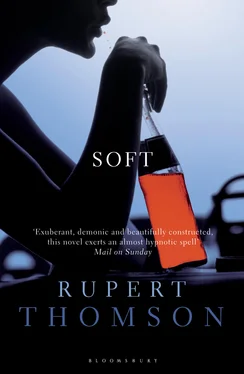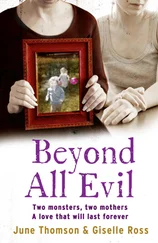Rupert Thomson - Soft
Здесь есть возможность читать онлайн «Rupert Thomson - Soft» весь текст электронной книги совершенно бесплатно (целиком полную версию без сокращений). В некоторых случаях можно слушать аудио, скачать через торрент в формате fb2 и присутствует краткое содержание. Год выпуска: 2012, Издательство: Bloomsbury Paperbacks, Жанр: Современная проза, на английском языке. Описание произведения, (предисловие) а так же отзывы посетителей доступны на портале библиотеки ЛибКат.
- Название:Soft
- Автор:
- Издательство:Bloomsbury Paperbacks
- Жанр:
- Год:2012
- ISBN:нет данных
- Рейтинг книги:3 / 5. Голосов: 1
-
Избранное:Добавить в избранное
- Отзывы:
-
Ваша оценка:
- 60
- 1
- 2
- 3
- 4
- 5
Soft: краткое содержание, описание и аннотация
Предлагаем к чтению аннотацию, описание, краткое содержание или предисловие (зависит от того, что написал сам автор книги «Soft»). Если вы не нашли необходимую информацию о книге — напишите в комментариях, мы постараемся отыскать её.
Soft — читать онлайн бесплатно полную книгу (весь текст) целиком
Ниже представлен текст книги, разбитый по страницам. Система сохранения места последней прочитанной страницы, позволяет с удобством читать онлайн бесплатно книгу «Soft», без необходимости каждый раз заново искать на чём Вы остановились. Поставьте закладку, и сможете в любой момент перейти на страницу, на которой закончили чтение.
Интервал:
Закладка:
Then he noticed her.
A wet night in Stonehouse, rain blowing sideways through the streetlights. Still summer, though. His denim jacket soaked, he pushed through the pub’s double-doors. Stood at the bar and smoothed his hair back with both hands, fingers spread over his head, thumbs skimming the tops of his ears. A couple of musicians were setting up next to the Emergency Exit — one of those second-rate bands that tour the country playing other people’s songs. A scrawny man in cowboy boots and jeans was tuning a battered white guitar. Then he stepped forwards. Put his face close to the microphone. One-two. One-two. Sshh. Sshh. One-two … Nothing irritated Barker more. He sat on his tall red stool and scowled. A voice asked him if he was being served. He looked round. Freckles spattered the girl’s bare arms, and one side of her mouth seemed higher than the other when she smiled.
‘You new here?’ he said.
‘No,’ she said. ‘Why? Are you?’
He liked that — the cheek of it. The nerve. He bought her a drink. A ginger ale. And that was what she tasted of when he kissed her, about an hour later, behind the old Pickford’s building on Millbay Road. Ginger ale. Once, she leaned back, away from him, and said, ‘You’re an ugly bastard, aren’t you.’ It was one of those things women say when they like you and they’re not sure why.
She wouldn’t let him fuck her on the street, which was what he wanted, but she didn’t stop him pushing her T-shirt up and pulling down her bra so he could see her breasts shining in the raw white glare of the nearby car-park. When he reached under her skirt, though, she began to struggle.
‘Not now.’
‘When then?’
‘Tomorrow. My night off.’
Steam flowered in the sky behind her; they must have been working late at the laundry that weekend. He walked her back, just one word in his head. Tomorrow . A terrace of brick houses, drainpipes chuckling with the last of the rain. Weeds growing sideways in the walls. And the pub’s double-doors half-open, dirty red carpet, dirty golden light, and from where he was standing, on the pavement, he could see the man with the cowboy boots and the white guitar, talking his way into a song: I’d do this for Dolly Parton, only she’s not here …
At the end of the month Barker walked into Lou’s and had the barmaid’s name tattooed across his chest in big block capitals. LESLIE . Lou tried to warn him. Always a mistake, he said, to have a woman’s name tattooed across your chest. You want to get rid of it, you can’t. But Barker didn’t listen.
‘You coming or what?’
He looked round. Charlton Williams was waiting by the door and, beyond him, in the gritty London sunshine, Ronnie and Malcolm were facing each other, pointing at a folded newspaper and nodding.
From the window of his room in Charlton’s house Barker had a view of the entire estate. Built during the early seventies, the houses were neat boxes of white weatherboard and brick, their front gardens almost non-existent, their short, steep drives more than a match for the hand-brake on most cars. None of the streets followed straight lines. The thinking was, if a street dipped and twisted a bit, then it had character. Nature was just around the corner. You could almost believe you were living in the country.
The Isle of Dogs.
Each morning Barker would wake with an empty feeling in his stomach that had nothing to do with hunger and for a moment he would wonder where he was. The walls were smudged with strangers’ fingerprints. A fawn carpet curled against the skirting-board. Then he would see his bags. They lay on the floor under the window, zips gaping. Glimpses of his few possessions: the dull gleam of the weights, his bright-red bowling shirt, the edge of a history book. You’re lucky, he told himself, to have a place at all. He had Ray to thank for it. When Barker mentioned he was leaving, Ray said he would give his mate a call. They had served in the Army together. The Green Jackets. Five minutes on the mobile phone and it was fixed. Though grateful, Barker felt uneasy. He’d seen the look on Ray’s face. Somewhere deep down, below the skin, it said, You’re in my pocket now. You owe me one .
He owed Charlton too, of course — a man he knew much less about. Charlton worked nights at the meat market, but he would never say exactly what he did and Barker chose not to ask. He had to be earning good money, though, because he slept in satin sheets and drove a brand-new Ford Sierra. A shame he didn’t spend some of it on a cleaning-lady. If Charlton had a woman over, he would always try and talk her into tidying the house. Otherwise the empty pizza-boxes piled up like red-and-white pagodas, and the fridge began to smell. Charlton had given Barker the spare room, telling him that he could stay as long as he wanted. Any friend of Ray’s, etc. etc. It turned out that Ray had saved Charlton’s life while they were in Northern Ireland — or so Charlton said three or four days after Barker moved in. Charlton had just finished work and he was sitting at the kitchen table with a bottle of Bell’s while Barker fried some bacon.
‘I wouldn’t be here now,’ he said, swilling the whisky slowly round the inside of his glass. ‘You’ve seen Ray in action, right?’
Barker broke two eggs into the fat and watched the white appear. ‘We were working in a club once,’ he said, ‘and three blokes wanted to get in. Navy, they were. Shit-faced. Ray told them no. They didn’t like that.’ Barker turned to Charlton, spatula in hand. ‘I never saw exactly how he did it, he moved that fast. But, next time I looked, two of the blokes were lying on the ground and the third was making a run for it.’
Charlton nodded. ‘Grasp Sparrow By The Tail.’
‘You what?’ Barker said.
‘Drive Away Monkey.’
‘What are you on about?’
‘Tai Chi.’ Charlton grinned. ‘Ray’s been doing it for years. We used to take the piss out of him.’ Charlton started waving his arms around in the air, slow-motion, his fingers splayed, like a hypnotist or a magician.
‘What’s the story with the sparrows?’ Barker said.
‘It’s one of the positions. The idea is, you’re always ready. Never caught off balance.’ Charlton finished his drink. ‘What’s Ray up to these days?’
‘This and that.’ Barker flipped the eggs so as to brown them on both sides. ‘He’s got kids now.’
‘Yeah?’
‘Two boys.’
Charlton shook his head. ‘Fuck me,’ he said, and yawned.
Though Barker had put two hundred and fifty miles between himself and Plymouth, he hadn’t shaken off its influence. During his second week as Charlton’s guest, he woke from a dream — or thought he woke — to see the Scullys outside his bedroom window. They looked cold, especially the girl, as if they had been standing on the road all night, their lips dark-mauve like the lips of people with heart conditions, their faces smooth, inscrutable. Two of the men stood on the green mound opposite the house, their arms folded, their feet apart, while the third leaned casually against a parked car. The girl shivered on the pavement, under a streetlamp, both hands tucked into her armpits. All four were staring up at him, their strange, wide-spaced eyes fastened on his window. At last the man who was leaning against the car lifted a hand into the air and Barker saw something dangling from his index finger, something that was flimsy, almost transparent. In his dream Barker peered closer. The man was holding a pair of knickers that belonged to Barker’s ex-wife, Leslie. The man swung the knickers on his finger, almost as if he was teasing a dog. All the Scullys were grinning now, and their grins told Barker everything.
He lay on his back in the narrow bed and studied the pattern of smudges on the wall. Maybe he should have paid Leslie more attention — or maybe there was nothing he could have done. He remembered the smell of other people’s meals as he climbed the five flights of stairs to her tiny attic flat in Devonport. On summer evenings, during their first intoxicating days together, she would put James Last records on the stereo, then she’d strip down to her underwear and dance for him. Her breasts cupped and threatening to spill, her plump thighs curving towards that succulence above — he had never seen a woman who looked so good. He married her in September — he’d just turned twenty-four (she was twenty-seven) — and two months later he heard that she’d been seen with Gavin Stringer in the Garter Club on Union Street. He broke a pool cue on the side of Stringer’s head. That slowed him up a bit. By the time Christmas came, it was someone else — a fireman from Whitsand Bay. Barker tracked him down on a night of gale-force winds in January. The fireman’s hair kept flattening, the way grass does when a helicopter lands. Barker hit him in the stomach, feeling the organs jostle, rupture, split under his knuckles. Then he hit him in the face. Left him slumped on the pavement like a tramp or a drunk, one eyeball swinging against his cheek. ‘All this violence,’ and Leslie shook her head. ‘I just can’t deal with it.’ ‘But it’s because of you,’ he shouted. ‘It’s you.’ That wasn’t the whole truth, though, and they both knew it. The marriage lasted less than a year.
Читать дальшеИнтервал:
Закладка:
Похожие книги на «Soft»
Представляем Вашему вниманию похожие книги на «Soft» списком для выбора. Мы отобрали схожую по названию и смыслу литературу в надежде предоставить читателям больше вариантов отыскать новые, интересные, ещё непрочитанные произведения.
Обсуждение, отзывы о книге «Soft» и просто собственные мнения читателей. Оставьте ваши комментарии, напишите, что Вы думаете о произведении, его смысле или главных героях. Укажите что конкретно понравилось, а что нет, и почему Вы так считаете.












